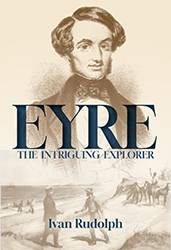Dutton Mystery
C.C.Dutton and his overlanding party disappeared without trace in 1842.
The fact that 24 cattle and the only horse returned to Port Lincoln, beginning a few days after Dutton set out, suggested an ambush rather than disorientation of the party. After all, though Dutton’s bush craft was suspect, Sandy McDonald’s was first class. It was concluded by Eyre that Dutton’s party had almost certainly perished at the hands of Aborigines, circumstances unknown. James Hawker, one of the volunteers sent to search for him, commented: “It was noticed at the time of Mr Dutton’s departure that the Aborigines cleared out from Port Lincoln district very suddenly. Their object, they said, was to avenge themselves on Mr Dutton for his having made prisoners of natives and having punished them for various delinquencies on his station.”
Schurmann heard whispers from locals that certain perpetrators had killed Dutton’s party and had taken everything to the far north. Other stories surfaced also, perhaps the most likely being that recorded by Nathaniel Hailes at the time, given by a local Aborigine. Hailes believed the account could be true because the man described accurately various physical features of the different members of the party, for example, “Cox’s relative shortness he correctly described and that individual being very much pitted with smallpox. He vividly described that deformity by touching his face in several places with the tip of a forefinger.”
Impressed by this, Hailes took the Aborigine to the Port Lincoln courthouse and his statement was taken.
The narrative amounted to this. One day, towards sundown, Dutton and Cox were in advance of the other members of the party. It was their custom, while I travelled with them, for one or both to precede the dray and cattle immediately after the midday meal, in search of a suitable camping place for the night. On this occasion they must have been later than usual in halting, probably because they could not readily find water. Dutton and Cox came across a party of native women who were making preparations to encamp for the night, from which circumstances might be inferred the fact that water was not far distant.
The women, on seeing the white faces, started off like so many startled deer, except for one who Dutton detained by the wrists. The whole of them commenced a shrill piercing shriek that is common on such occasions and which I have heard in the stillness of evening at a distance of four miles. It resembles the steam whistle of a railway locomotive more than any other sound I am acquainted with.
The men of the tribe suddenly appeared on all sides. Abandoning their game, spears and skin garments, they rushed to the rescue of the woman and killed the two white men with their waddies.
Haldane then came up with the dray and shared a similar fate.
The tragedy was completed on arrival of Graham and Brown with the cattle, the fatal waddies inflicting a painful and bloody death on them also.
Policeman James McLean mentions a letter that came to his attention in 1846, which could tie in with the above account. It involved a grisly find made by Tennant and Anderson during the first-ever successful overlanding of stock to Port Lincoln.
They came upon Dutton’s dray, and underneath were the bodies of the whole of that unfortunate party; but it was impossible to tell how they came by their death. The place where the dray was found was but a short distance from where Messrs. Eyre, Rose, McCulloch and I had quitted the track. Had Mr Eyre followed it up (but couldn’t through lack of water) we should have known more of their fate, though they must have been dead by then. So ended the days of my old friend, big Sandy McDonald.
Whether this account or any other was factual has never been determined officially. Their disappearance remains a strange mystery because no relics have been recovered.
Gwenneth Williams wrote that by 1856, “Port Lincoln was settled and showed signs of increasing prosperity. Many overlanders found fresh employment by taking stock thither.” These later overlanders drove cattle from Adelaide to Port Lincoln successfully more-or-less along the route that Eyre first pioneered, demonstrating that the route was a feasible one and that the disappearance of Dutton’s party was most likely the consequence of ambush by Aborigines rather than perishing from thirst.



